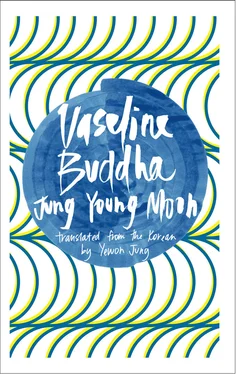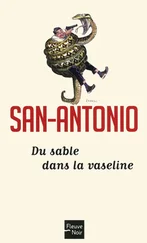Nevertheless, for some reason, I went to the Eiffel Tower area the next day, and snuck my way into a group of tourists and listened for a moment to the guide’s explanation, and in the end, I tried to climb the massive steel tower — perhaps because of the long queue under the tower, made up of people who wanted to climb it, which gradually grew shorter but seemed as if it would never give you a turn, and perhaps I just wanted to stand in the queue without thinking about anything — but when I was almost at the ticket booth after waiting in the long queue, I broke away from it, again for some reason, a reason that may or may not have been reasonable, and then queued up again, once again for some reason — I was making an effort not to climb the Eiffel Tower, which seemed to be beckoning at me with effort, telling me to climb up its body — and when it was my turn, I left the queue like someone who had changed his mind at the last minute, and vowed that I would never come near the Eiffel Tower again, and left the area and checked into another hotel from which, of course, a part of the tower could be seen. I thought of the museums I’d visited on my previous trip to Paris, but I didn’t want to see any paintings this time.
As I lay in bed looking at the Eiffel Tower, which could be seen only in part through the hotel window, I once again had a vague thought that there are certain scenes, objects, that you can see freely at last when they’re seen only in part, and that there are moments in which a part of something becomes equal to the thing itself, although it doesn’t surpass the thing. And I thought that the reason why I didn’t climb the Eiffel Tower wasn’t because I had lost my nerve at seeing the massive tower, which could be seen only in part through the window at that moment, but which stood in stately glory when seen from just below. What did make me lose my nerve, for no reason, was the statue of a peeing boy I saw in Brussels.
In the hotel room I felt uncomfortable looking at the Eiffel Tower, which could be seen only in part through the window, and which reminded me that I was in Paris, and at one point, I leapt up from the bed and ran to the window as if in a race, and closed and opened the curtains several times, repeating the act until the scene out the window looked resigned, and, in the end, I closed the window and the curtains completely so that it could no longer be seen. And then I had the sudden thought that a part of the top of the tower that could be seen from my house, one of the symbols of the city in which I lived, could be seen from my bedroom window, and I felt at ease, thinking that I was in a hotel somewhere in the world. I lay still in bed, listening to the sound of quiet footsteps of people passing through the corridor from time to time, which the carpet absorbed, and when the sound faded away and silence fell again, I mumbled some words that sounded like footsteps.
And at one point I took out the map of downtown Paris I got from the tourist information office, and put a candle flame to the spot I assumed to be the hotel I was staying at and made the small flame spread out in a circle, swallow some areas here and there in downtown Paris, and, in the end, turn the map into ashes, rendering downtown Paris void. And looking at the faint circle of light, created by the candle flame that had set all of Paris ablaze, I came up with the expression “corrupt light.” And I thought of Kafka, who died a terribly painful death due to laryngeal tuberculosis at a sanitarium in Austria — for at the time I was on the last page of a thick compilation of his letters — and pictured myself pacing around the sanitarium courtyard for a moment, looking at the window of the room where Kafka must be dying, and at one point the sanitarium overlapped with the Parisian hotel in which I was staying, for I was coughing severely, like a tuberculosis patient, from a cold I’d caught earlier.
Looking at the ordinary wallpaper in the hotel room in which I was staying, I briefly considered death in a hotel room in a foreign land, which I’d always considered, and how a hotel room was a good place in which to have such a thought. But taking my own life still seemed premature, and I thought about suicide only in a vague and faint way.
And I recalled the time several years earlier when I went to France and stayed in a small town with no clear purpose or reason, in order to leave the country where I was born and lived in because I couldn’t stand almost anything about it.
When I thought of the small town, someone always came to my mind before anything else. In a little square in that French town I stayed in there was a statue of someone who was a scientist as well as a cyclist, and a beggar who was the spitting image of Karl Marx always sat next to it at a certain hour. But the beggar, at whose side was a bag which looked as if it would contain The Communist Manifesto, didn’t do anything at all, as if he had forgotten his duty as a beggar, or as if he were doing his duty as a beggar. I’d never seen a beggar who didn’t do anything, not to that extent. It seemed that the man, who looked questionable as a beggar, carried out his routine activities such as eating or receiving alms in other places, and his spot next to the statue seemed to be a place he visited in order to not do anything. No, it’s not true that he didn’t do anything at all. He did one thing, which was to take out some kind of a candy from his pocket at a certain time of the day, take off the plastic wrapping and put the candy in his mouth, and suck on it quietly like someone lost in meditation, and when he did, it seemed as if the present world, whose ideals haven’t been realized, were quietly, sweetly crumbling away. No, this isn’t true. He didn’t do anything at all, not even suck on a candy. It was my imagination that put a candy in his mouth. That didn’t suit him. He was better off doing nothing, which, fortunately, was what he was doing. In that town, where I saw a dolphin tube float down the river one winter, or which I left, thinking I saw a dolphin tube floating down the river, I dated a French woman for several months, and we would drive to nearby castles in her little car, and take walks in the woods, or hold each other in the woods, smelling the grass and talking, or taking a nap. One day, awake from one of those naps in the woods, I saw her, still in her sleep, and suddenly felt as if my life were happening out of my hands, which felt pleasant beyond description, which made me smile, and she, awake now, asked me the why I was smiling. When I didn’t tell her the reason, she didn’t pry, and I said it would be nice if we could come like this more often and take naps, and we did so several more times. And I would go see her on the bicycle she lent me, and the handlebars of the old bicycle were slightly turned to the left, so in order to go in a straight line, I had to mentally turn them slightly to the right, and do so in reality. Anyway, one day, I found that the bicycle, which I’d placed in a park, was gone. Someone had brutally severed the chain and taken the bicycle. We didn’t go around looking for the lost bicycle, but for several days after that whenever we sat in cafes we would stare fixedly at passing bicycles, and she said that her bicycle was easily recognizable. I felt as if she were saying that she could recognize her own baby, so I felt it imperative that we find the bicycle. But finding a lost bicycle was harder than finding a lost baby, and we never did find the bicycle. And we seriously discussed stealing someone’s bicycle, but we didn’t actually commit theft. Still, we kept our eyes on bicycles when we took walks, and all the bicycles were brutally chained up. I don’t remember much else about her, but I do remember that thanks to her I learned French very quickly, and that she made me feel awkward by crying when I left the city. I awkwardly took her hand and tried to respond in a way you should in front of someone crying, but it wasn’t easy. Fortunately, she didn’t seem to notice that I felt awkward, because she was busy crying. With that, I could sum up what happened between us. (It may be wrong to talk about your relationship with someone, short or long, and furthermore, about someone’s life, in such a way, but everything can be summed up in a few sentences.)
Читать дальше












